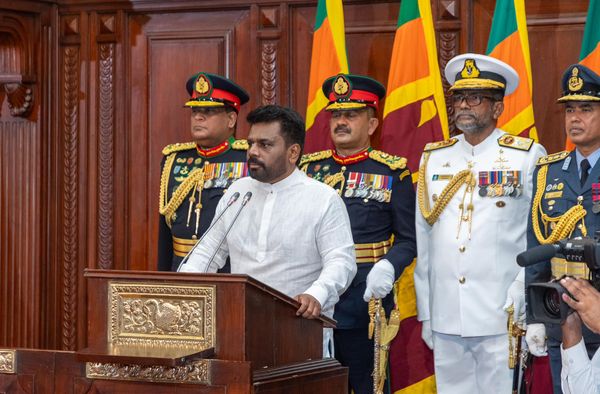Sri Lanka’s new president, Anura Kumara Dissanayake, has been sworn into office, pledging to pursue “clean” politics as the nation navigates its recovery from a severe economic crisis.
Dissanayake, a left-leaning leader, positions himself as a disruptor of the entrenched political establishment. Analysts view his election as a clear rejection of the corruption and cronyism that have long troubled the country.
This election, held on Saturday, marks the first since 2022, when widespread discontent over the economic collapse sparked mass protests, leading to the ousting of former president Gotabaya Rajapaksa.
“We need to establish a new clean political culture,” he said. “I commit to achieving this. We will do the utmost to win back the people’s respect and trust in the political system.”
The 55-year-old, who is familiarly known as AKD, told Sri Lankans that “democracy doesn’t end with voting in a leader”.
“We need to strengthen democracy. I pledge to do my utmost to safeguard democracy,” he said.
“I have said before that I am not a magician – I am an ordinary citizen. There are things I know and don’t know. My aim is to gather those with the knowledge and skills to help lift this country.”
At the conclusion of his speech, Anura Kumara Dissanayake received a Buddhist blessing, with representatives from Sri Lanka’s other major religions—Islam, Hinduism, and Christianity—also in attendance. This gesture underscored the new president’s focus on promoting diversity.
In a statement issued on the eve of the inauguration, Dissanayake emphasized that the “unity of Sinhalese, Tamils, Muslims, and all Sri Lankans is the foundation of this new chapter.”
Throughout his campaign, Dissanayake pledged to uphold good governance and implement strict anti-corruption measures.
He has vowed to boost Sri Lanka’s manufacturing, agriculture, and IT sectors, while also maintaining the agreement with the International Monetary Fund (IMF) to rescue the country from its economic crisis, ensuring that the poorest are protected from the harshest austerity measures.
Sri Lankan Prime Minister Dinesh Gunawardena resigned ahead of Dissanayake’s swearing-in, clearing the way for the dissolution of parliament. In an earlier interview with BBC Sinhala, Dissanayake indicated that he would dissolve parliament shortly after taking office.
“There is no point continuing with a parliament that is not in line with what the people want,” he said at the time.
Dissanayake secured victory after the election went into a second round on Sunday, as no candidate achieved more than 50% of the votes in the first round.
Once second- and third-choice votes were counted, the Election Commission announced that Dissanayake had won with a total of 5,740,179 votes.
Opposition leader Sajith Premadasa finished second with 4,530,902 votes, while outgoing President Ranil Wickremesinghe, who received 2,299,767 votes in the first round, was eliminated from the second round.
Wickremesinghe congratulated Dissanayake, saying, “With much love and respect for this beloved nation, I hand over its future to the new president.”
This election marked the first time since 1982 that Sri Lanka’s presidential race went beyond the first round, making it one of the closest in the nation’s history.
Dissanayake’s strong anti-corruption platform struck a chord with voters, who have been demanding reform since the country’s crisis.
This support helped him overcome concerns about the violent past of his political party, the Marxist Janatha Vimukthi Peramuna (JVP), which led two armed uprisings in the 1970s and 80s.
His coalition, the National People’s Power (NPP), which includes the JVP, gained significant traction during the 2022 protests, known as the Aragalaya, or “struggle” in Sinhala.
In recent years, Dissanayake has worked to soften the hard-left image of his party.
Economic meltdown
The new president will face the dual challenges of revitalizing the economy and alleviating the severe poverty affecting millions.
The Aragalaya uprising, which forced Rajapaksa from office in 2022, was driven by an economic collapse.
At the time, Sri Lanka’s foreign currency reserves were depleted, leaving the country unable to import essential goods like fuel. Public debt surged to $83 billion, while inflation skyrocketed to 70%.
This made basic necessities, such as food and medicine, unaffordable for many citizens.
The country’s economic crisis has been attributed to major policy mistakes, weak export performance, and years of insufficient taxation.
The situation worsened during the Covid-19 pandemic, which crippled tourism, a vital source of income.
Additionally, widespread frustration over corruption and mismanagement fueled public outrage against Rajapaksa and his family, who had collectively governed Sri Lanka for over a decade.



